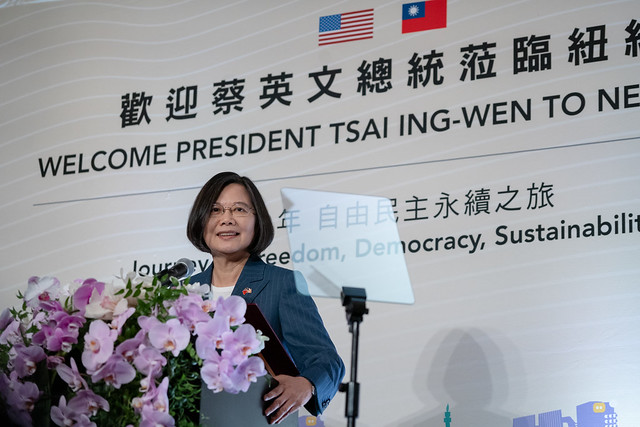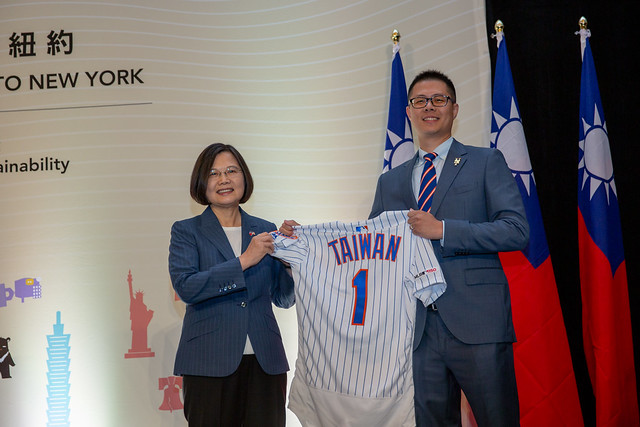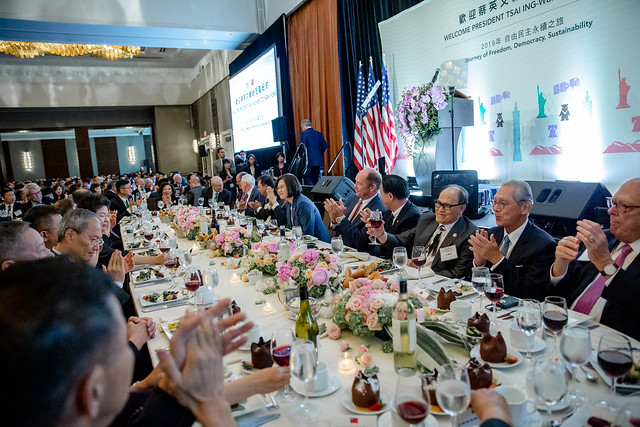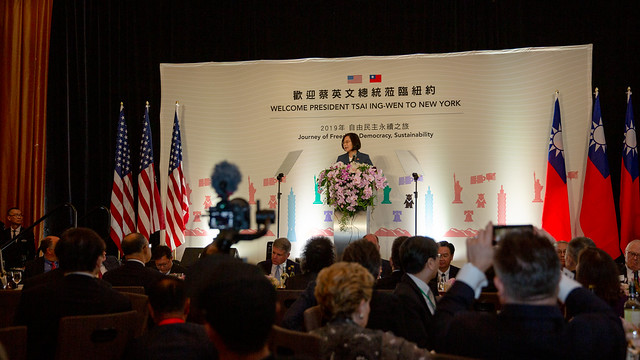News & activities
 News releases
News releases
President Tsai Ing-wen, currently traveling overseas on her Journey of Freedom, Democracy, and Sustainability, attended a banquet with the local and Taiwanese expatriate communities in New York on the evening of July 12 local time (morning of July 13 Taipei time). The president thanked the expatriates for their staunch support and said that the Taiwan government will resolutely defend the right of the Taiwanese people to decide their future through democratic means. She further affirmed that the government will share with the international community Taiwan's experience in preventing the spread of disinformation, so that we can all join together in defending democratic values.
In remarks to more than 1,000 assembled guests, President Tsai began by saying she was delighted to see everyone in New York, and that this was her first time in New York as president of the Republic of China (Taiwan). She often came to New York, she said, when she studied in the United States, and seeing the familiar street scenes once again brought back fond memories. As president, however, there are security considerations that prevent her from wandering freely around the streets like she did when she was young, which was a little sad. But for a president of the Republic of China (Taiwan), she said, that's a small sacrifice.
The president said that, of course, she did not come to New York to relive old memories. As soon as the aircraft landed the day before, the delegation dove right in and got down to work. Our one and only objective, she said, is to lead the nation out onto the global stage.
The last time she was in New York was in 2015, she said, when she was still running for president. She recalled being impressed by how passionate everyone was. And the fact that so many expatriates were present, she said, shows that everyone still has that same desire, so she hopes everyone will join her, and continue to give their all to make Taiwan a better place.
President Tsai delivered remarks in Mandarin, Taiwanese, and English. The following is a transcript of her remarks in English:
Good evening! Thank you all for being here! It is great to be here in New York and to have this opportunity to get together with our American friends and members of the Taiwanese-American community.
I want to acknowledge some of our good friends tonight, Congressman [Michael] McCaul, Congressman [Ted] Yoho, Chairman [James] Moriarty, Dr. Ed Feulner, and many others. Thank you for being here.
My last time in New York was in 2015, when I spoke to nearly 1,500 Taiwanese-Americans. So you might want to say that I am pretty used to being at big gatherings in New York and I am also used to receiving a warm welcome here in New York, too.
Taiwanese-Americans are integral to the fabric of society in New York. Many made the decision to serve the public by going into politics, such as New York State Senator John Liu.
The Taiwan Center in Flushing was the first Taiwanese-American organization in the US and is the largest in the country. And I hear that the annual Passport to Taiwan always attracts large crowds wanting a taste of Taiwan's unique delicacies and diverse culture.
This is not to mention your many successful business ventures that have helped create thousands of jobs in this city. So I think everyone here deserves a round of applause.
Taiwan and New York are more alike than you might think. We both take pride in our progressive society, openness to new ideas, and tolerance for different opinions, like the noise outside this hotel.
Just as the Statue of Liberty served as a symbol of American freedom lighting the way for future democracies, Taiwan is a beacon of democracy in the Indo-Pacific. We have walked the long path from authoritarianism to free and open democracy. And that path was not an easy one.
Yet, those who came before us were committed to seeing it through. Their legacy, our democratic achievement, belongs to all 23 million Taiwanese, and all of you here as well. Of course, with the help of our American friends.
Freedom is irrevocably ingrained in every aspect of our lives, in our freedom of speech, freedom of the press, freedom of religion, freedom of expression, and most certainly, the freedom to run for office and exercise our right to vote.
I'm sure you all know that people in Taiwan are highly attuned to politics, and we take our elections seriously. Be it in principle or in practice, freedom and democracy have become our way of life.
But we cannot take Taiwan's hard-earned freedom and democracy for granted, nor can the world afford to ignore our predicament. Because freedom around the world is under threat like never before. Authoritarian abuses of power dominate the headlines. Freedom House even titled its 2019 report "Democracy in Retreat."
As authoritarian regimes refine and introduce new methods of political and economic subversion, these influences are beginning to creep outward. They seek to undermine our democracy by spreading disinformation through new forms of media, blurring the line between fact and fiction.
And this threat affects us all, because even established democracies have shown themselves to be vulnerable to their exploitations.
Taiwan has long been on the frontlines of this battle. In recent years, Taiwan has also become a testing ground for new infiltration and influence tactics.
My administration is constantly vigilant and actively pushing back. We work around the clock to safeguard our hard-earned freedom by promoting media literacy, empowering our law enforcement agencies, and updating laws and regulations to keep our country safe.
Just this month, we completed major legislative amendments that are helping keep our country and people safe.
We know that cybersecurity is the future of national security, and we have established a legal framework to identify and prevent the spread of disinformation.
We have amended laws that will allow us to prosecute persons working for forces that seek to undermine our democracy. And we are cracking down on intelligence leaks by placing heavier restrictions on former officials and those with access to classified information.
Most importantly, we are guaranteeing the Taiwanese people's right to choose their own future through democratic means.
Taiwan is a bastion of democracy facing down encroaching authoritarianism. And Taiwan's existence helps safeguard democracies around the world. But we cannot do this alone. It is absolutely crucial for democracies to work together to counter the expansion of authoritarian influences.
Rest assured, our government will resolutely defend our freedom, democracy and way of life. We will bolster our defenses against both conventional and hybrid threats.
We are determined to safeguard our sovereignty. And we always stand ready to share our experiences and contribute to the international community.
Over the past three years, we have worked day in and day out with three goals in mind: to keep Taiwan safe, transform our economy, and engage with the world. We will continue to push for reforms that foster equality and help us compete in the global market. And we will continue to work with the United States to advocate for our common values.
Once again, I want to thank all of you for your unwavering support. In our ever-changing world, we need the support of our overseas community and like-minded friends in the US as we continue on the path of reform and a better future for us all.
Thank you.
Following President Tsai's remarks, American Institute in Taiwan Chairman James Moriarty delivered remarks of his own. He welcomed President Tsai and her delegation to New York, and noted that this was her first time in New York as president. Commenting that this year marks the 40th anniversary of the passage of the Taiwan Relations Act, the chairman said it was extremely significant that President Tsai is visiting at this time. He pointed out that US-Taiwan relations are very close, and even though Taiwan only has a population of 23 million, it is nevertheless the 11th-largest trading partner of the United States. He added that both sides have seen relations reach new heights not only because of shared interests, but even more important, because of our shared values.
Next, Freedom House president Michael J. Abramowitz delivered remarks in which he praised Taiwan for its progress as a democracy and mentioned that the more free and democratic Taiwan becomes, the more pressure it comes under from Beijing. President Abramowitz emphasized that Taiwan is a model of democracy in Asia and deserves the support of the United States and other countries throughout the world.
Professor Andrew Nathan, representing the National Endowment for Democracy (NED), also delivered remarks, reading aloud from a letter written by NED president Carl Gershman. President Gershman said in his letter that it had been a great honor for him to take part last year along with President Tsai in activities marking the 15th anniversary of the founding of the Taiwan Foundation for Democracy. Noting that President Tsai is Taiwan's first popularly elected woman president, he said this represents an important step forward for Taiwan's democracy. The challenges presented by China, he said, makes Taiwan’s democracy all the more commendable.
Shortly thereafter, Freedom House president Michael J. Abramowitz and NED representative Andrew Nathan jointly presented President Tsai with a painting of the Goddess of Democracy. In addition, Mr. Wang Wei-cheng (王偉成), the director of Asian markets for the New York Mets organization, presented President Tsai with a New York Mets No. 1 jersey with the word "Taiwan" on the back.












